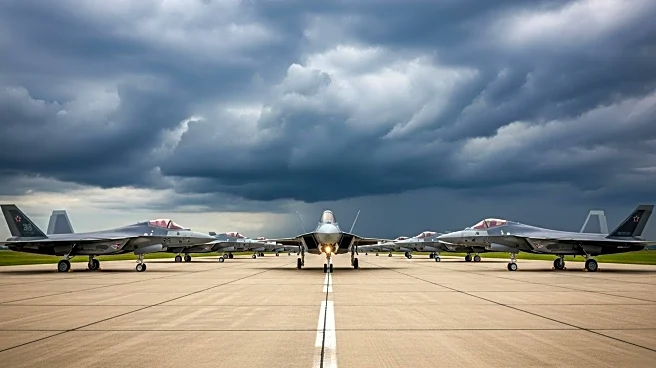What's Happening?
NATO members have committed to increasing their defense spending to 5% of GDP in response to perceived threats from Russia, including hybrid warfare tactics. This decision comes as European officials recognize the need to bolster regional security against Russia's activities, which include drone incursions, cyberattacks, and election interference. European Commission President Ursula von der Leyen emphasized the seriousness of these threats, describing them as part of a concerted campaign to destabilize the region. The initiative includes potential flagship defense projects like the Eastern Flank Watch, which proposes a 'drone wall' network to protect against airspace violations. However, there is some skepticism about the feasibility of such projects, with Germany's defense minister expressing reservations.
Why It's Important?
The pledge to increase defense spending reflects a significant shift in European security policy, driven by the need to counteract Russia's hybrid warfare tactics. This move is likely to impact U.S. defense policy as well, as NATO's 5% GDP target may influence discussions on the U.S. defense budget. The increased spending could lead to substantial investments in defense infrastructure and technology, benefiting industries involved in military and aerospace sectors. However, it also raises concerns about escalating military tensions and the potential for increased conflict in the region. Countries supporting Ukraine, such as the Baltic states, Finland, and Poland, are expected to be primary targets of Russian hybrid activities, making their security a priority.
What's Next?
European governments are expected to continue discussions on implementing defense projects like the Eastern Flank Watch. The feasibility and effectiveness of such initiatives will be scrutinized, particularly in light of Germany's reservations. NATO members will likely explore further collaborations to enhance surveillance and communications infrastructure. The U.S. may also reassess its defense budget to align with NATO's spending goals, potentially leading to increased investments in military technology and infrastructure. Political leaders and defense experts will monitor Russia's activities closely, preparing countermeasures to mitigate hybrid warfare threats.
Beyond the Headlines
The commitment to increased defense spending highlights the evolving nature of warfare, where traditional military tactics are supplemented by cyber and information warfare. This shift necessitates a reevaluation of defense strategies, focusing on technological advancements and cybersecurity measures. The ethical implications of such warfare, including the impact on civilian infrastructure and privacy, will be a topic of debate. Long-term, this development could lead to a more militarized Europe, with increased defense collaboration among member states.










